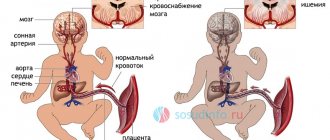Causes of psycho-emotional stress
When the described processes are controlled, any experiences only strengthen a person, allow him to adapt and adjust to the conditions of modern life. But there are completely different situations and life’s ups and downs that can simply knock a person out of his usual rut. That’s when he begins to experience psycho-emotional stress, which can damage a person’s psychological health. What could it be?
- Death of a loved one.
- Family divorce.
- Financial bankruptcy.
- Deadly diagnosis.
- Professional conflicts.
- Change of place of work.
Any traumatic events are dangerous; they give impetus to the development of complex negative consequences, one way or another affecting a person’s overall health.
Emotional stress - mechanisms and effects
Despite the fact that the mechanism of stress on the body is the same for all people, each person will react to sudden difficulties in their own way. This is explained by the fact that stress can be not only objective, but also subjective. The first category includes mental or physical stress, the second includes personal fears and anxieties. Of course, for each person they are individual and dictated by personal experience and mental characteristics. Some people are afraid of darkness or heights, while others are afraid to make new acquaintances.
Emotional stress is a trigger for the inclusion of additional capabilities of the body, which is forced to use all reserves to preserve itself. This can be expressed in a manifold increase in physical strength or the manifestation of hidden personality traits. It is sometimes said that stress can reveal the true essence of a person and turn an unresponsive quiet person into a firm and reasonable leader. However, it also happens the other way around: a person who is firm in everyday situations can lose control over himself and fall into panic. In the process of evolution, two main reactions to sudden threats have been developed, demonstrated by living organisms. Some of them “run away”, others prefer to “fight”. After the choice has occurred, all forces begin to obey the main scenario, the remaining needs turn out to be secondary and are satisfied according to the residual principle.
However, very often excessive load leads to depletion of strength and reserves, causing various health problems. The human body reacts to any stress and pressure by adapting to new conditions. Prolonged stress (from the English Stress - pressure, pressure, tension), which would be more correctly called distress (from the English Distress - misfortune, grief, need, exhaustion), negatively affects the state of the body as a whole.
Hans Selye distinguishes three phases in the stress syndrome.
• The first stage is called the alarm phase. This condition can last up to several days. the blood sugar level in the body rises sharply , the work of the hypothalamus, pituitary gland and adrenal glands is activated, and adrenaline is released. If all these chemical processes manage to return the body to a state of homeostasis, emotional stress subsides.
• If the impact of negative factors on the body continues, a longer second phase begins - the stage of resistance. At this stage, the body wages a cold war against stress agents. Its task is not to destroy negative factors, but to contain them, as well as neutralize their harmful influence. To do this, the adrenal glands produce corticosteroids, and blood, rich in glucose, rushes to the skin and muscles. This absorption of reserves allows the body to increase resistance to environmental factors and adapt to the situation.
• If the stress lasts longer and does not end with stabilization, the body depletes all its resources and begins to break down. This process indicates the onset of the third stage. Thus, in order to survive stress without loss, you need to have enough energy to fight it. This can only be achieved through maximum release of unnecessary tension.
An example of such behavior is the life of animals. They react only to objective stress; they do not have subjective, fictitious experiences. Moreover, they live “here and now.” In other words, only those problems that require immediate solutions are relevant to them. Before difficulties arise, they are calm, and after the negative factor has exhausted itself, they again lead a familiar and measured lifestyle.
Human destiny, on the contrary, consists entirely of unrest. They are provoked by the fact that our mind calculates all possible options for the development of events, drawing many reasons for alarm. In other words, real stress in people’s lives is a rare phenomenon; most often a person experiences virtual, imaginary difficulties.
Emotional stress is a necessary part of people's lives. The body of each person, due to its structure, is capable of withstanding periodic overloads. Without them, routine would make life monotonous and colorless. In addition, the lack of “shocks” also negatively affects the body, as does their excess. In this case, he loses his ability to adapt.
However, stress should be short-term, then it will be beneficial and strengthen your strength. And the rest of the time a person should be in a state of relaxation, which creates a feeling of harmony and integrity, and also maintains health at the proper level.
How to make money on cryptocurrency deposits?
Methods of dealing with psycho-emotional stress
For those who find themselves in a difficult situation, experts advise learning simple techniques of self-analysis. It helps to sort the problem into pieces and look for the right ways out of the current situation.
- You need to learn to recognize the problem and accept it, to understand what was especially unpleasant. You need to clearly define how you evaluate this psycho-emotional experience, what thoughts it brings.
- Learn to help yourself, take care of yourself, but do not neglect the help of friends and loved ones.
- Learn to solve problems that arise: wisely redistribute time, train self-confidence, understand the boundaries of your responsibility and the legitimacy of the demands placed on you.
Regulation and correction of emotional states
Practicing psychologists recommend not to ignore emotional tension and stressful situations, regardless of the stage at which it develops.
Regulation of stressful emotional states includes the following methods:
- Let's release our emotions - don't accumulate all the negativity and dissatisfaction inside yourself. You can get rid of them in different ways - it all depends on what a particular person likes. Drawing and yoga, breathing exercises - everyone chooses for themselves.
- We reveal our own soul - in this regard, the main condition is communication. Friends and acquaintances, relatives - the main thing is not to isolate yourself and your emotional experience of the situation and stress. The main thing is to communicate with optimists, positive-minded people.
- There are no friends or acquaintances who are ready to listen here and now? Entrust the situation and your own emotional experiences to paper - write poetry and draw. Just write down on a blank sheet of paper everything that you have experienced, what worries you and, most importantly, what you should do to overcome the situation and the negativity itself. This way you take control of the situation and, looking at the text or drawing, you will gradually understand what should be done next or what should be abandoned.
- Make your own map of stress factors that plunge you into an emotional crisis - in this case, the principle applies that you should know your enemy by sight. When you know what can plunge you into emotional stress, do everything to avoid these situations and the influence of negative factors on you - provocateurs. And the method itself will internally prepare you for the fact that a person will react less painfully and emotionally to many stimuli.
- Raising our own awareness . Knowledge is a great way to avoid and overcome uncontrollable emotions. The main thing is to have a sufficient amount of knowledge to your credit - the stronger a person as an individual is, freed from the herd instinct and not subject to everything that many experience due to their ignorance or banal ignorance.
- Change your own belief system . It is the system of one’s own foundations, rules and beliefs that can become an effective defense against emotional stress. If it is not formed, a person will perceive the world around him from the position of threats, constant problems and dangers, when a real threat is not perceived properly, and every little thing becomes a problem. In this regard, the main point is precisely the adequate response to the situation, the perception of the surrounding world, the entire reality happening around.
- Take on a difficult task - this will help distract you from emotional experiences, a stressful situation, helping you overcome and overcome, survive the stress factor.
- Correction of the condition, treatment and elimination of provoking factors.
Article on the topic: Neurological status - an example of writing a medical history in neurology
Regarding the issue of correcting an individual’s condition during the development of emotional stress, the situation can be corrected using the following methods and techniques:
- When a stressful situation develops, most often a person is visited by negative thoughts and emotions, fear and panic develop - everyone and every person is afraid, this is a normal reaction. But in this regard, thoughts and emotions should be directed in a positive direction - this will help correct the situation.
- Just face your fear face to face – face to face, so to speak. What is important here is that instead of removing an irritating factor from your environment, you should learn to control it, acting step by step - we are talking about replacing it with exposure.
- Be lenient with yourself and those around you - when realizing the replacement of fear with exposure, you should praise yourself for any positive decision, thought, step. This will help reduce the level of fear and emotional distress - the main thing is not to rush, do it gradually, step by step.
- Distract yourself from fear - if you are overwhelmed by emotional fear and a stressful situation, start counting from 500 to 3, read a book out loud, or just talk to yourself. Also determine the level of your emotional fear - just set the level from 1 to 10 and make such assessments constantly. All this will show that fear and stress will change constantly, its level falls and increases.
- Burn your adrenaline – When a person experiences emotional stress, his body produces large amounts of adrenaline. In order to prevent, correct and ultimately overcome your emotions, you should get rid of it. Everything is simple here - move, jump or run, hit a punching bag and when the emotions go away and your head becomes clear, you can begin to analyze the current situation.
The presented correction methods are not an exhaustive list - these are the most practiced, most often used from a huge arsenal of psychological and emotional correction of an individual’s behavior and condition.
Among other things, the patient should eliminate as much as possible during the recovery period all factors that provoke emotional stress and negative situations for his psyche.
Drug treatment
If correction methods do not give positive dynamics or the patient’s condition is advanced, doctors switch to a medicinal course of treatment.
When prescribing medications, doctors most often prescribe a course of tranquilizers and amino acids, beta blockers and herbal sedatives, as well as antidepressants.
To improve sleep and the general condition of the patient, a course of sleeping pills and vitamin complexes is prescribed.
Why is psycho-emotional stress dangerous?
Psycho-emotional stress is dangerous because it is long-term. Life can cause a lot of pain, but if you become obsessed with it and immerse yourself in it, forgetting about the instinct of self-preservation, the consequences will be irreversible. Psycho-emotional experiences give rise to anger, resentment and cruelty, change personality, overshadow a good and positive attitude, plunge a person into despondency and into complex, protracted depression.
No matter how painful it is, no matter what losses befall us, remember, life goes on, it rushes like a high-speed locomotive along the rails of time, rushing into the distance regardless of human desire. Therefore, you need to shake yourself up and find the strength to live on.
Symptoms inherent in such situations
Any manifestation of emotional stress and emotions, in principle, is individual for each person, however, if we generalize all the symptoms, then in any case it will have a negative connotation and coloring with the development of a stress explosion.
Article on the topic: Prevention of amebiasis in children and adults - ways and methods of preventing the disease
Symptoms will develop depending on what stage of development of stress the individual is at the moment.
Emotional stress can manifest itself with such negative symptoms as constant, chronic fatigue, apathy and irritability, which cannot be explained logically.
With emotional discord, the individual will feel fear, he is unable to hold back tears or nervous laughter, and experiences constant anxiety and despair, hopelessness.
Along with this, disorders and symptoms can also manifest themselves on an emotional level - increased sweating, increased temperature and blood pressure, and attacks of headaches.











